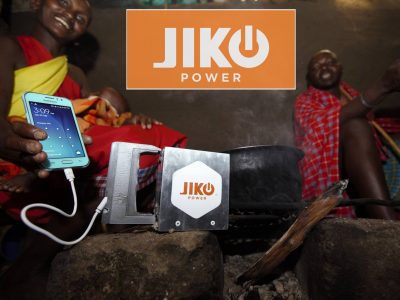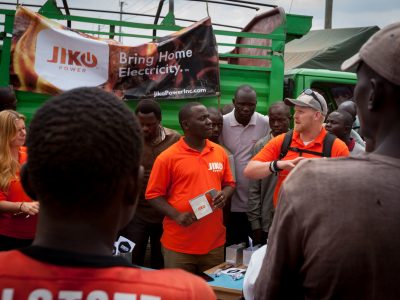Kickstarter Success Leaves JikoPower Team Glowing
 As the clock ticked down on JikoPower’s Kickstarter this November, company vice-president Marene Wiley found a moment to reflect on their journey. A few months prior, she’d traveled with company CEO Ryan Ahearn and marketing consultant Paul Denisenko to Kenya to distribute prototypes of the Spark, a charging device that converts energy from cooking stoves into a reusable power source for electronics. They sat together in a Maasai village and tasted the dusty, kerosene-saturated air as their device charged a Samsung Galaxy phone miles from the nearest electrical grid. The trip was still fresh in their minds when they kicked off the grueling 45-day crowdfunding campaign and successfully raised $52,511 from 249 backers.
As the clock ticked down on JikoPower’s Kickstarter this November, company vice-president Marene Wiley found a moment to reflect on their journey. A few months prior, she’d traveled with company CEO Ryan Ahearn and marketing consultant Paul Denisenko to Kenya to distribute prototypes of the Spark, a charging device that converts energy from cooking stoves into a reusable power source for electronics. They sat together in a Maasai village and tasted the dusty, kerosene-saturated air as their device charged a Samsung Galaxy phone miles from the nearest electrical grid. The trip was still fresh in their minds when they kicked off the grueling 45-day crowdfunding campaign and successfully raised $52,511 from 249 backers.
“As a recent graduate, you don’t really know how much fun people should be having versus how much work should be getting done,” said Wiley, who received a BA in political economy from the University of Washington earlier this year. “Together we’ve gone through ups and downs, but in the end this team has been incredible.”
The crowdfunding campaign and the trip to Kenya were born out of winning the $25,000 grand prize at the 2016 UW Business Plan Competition May 26. “We had to go and see for ourselves, meet the people, and witness their pain points,” said Ahearn. He estimates communities in developing nations like Kenya spend more than 10% of their income charging electronics. Like the Maasai, they have no outlets, no battery packs. Someone is chosen to gather up all the drained devices and drive to the nearest charging post, where they are plugged in beside hundreds of other devices for hours at a time.
Ahearn hopes the Spark will become a catalyst in poorer areas where power sources are scarce and electricity is priced at a premium in what has become a multi-billion dollar industry. However, the team knows that the Spark can also be used for camping and emergency situations. The Kickstarter taught them how difficult it could be to go after three markets at once.
“We had a shoe-string budget for advertising,” said Wiley. “So it was a challenge to share with others what we already know: the spark is the most versatile and durable thermo-electric product.”
JikoPower aims to sell 1 million devices over the next 5 years, which in turn, could improve the lives of up to 10 million people. The Kickstarter was a good first step. Wiley notes they received 163 first-time backers and had the rare campaign that showed consistent growth, not just spikes. At one point they were even trending in East Africa and Indonesia.
“We’re ready to stick our necks out,” said Ahearn. “Everyone who supported us and encouraged us believes, as we do, that JikoPower has real potential.”
The company earned features in the Seattle Times and on KING 5’s Evening Magazine a day after the campaign closed. Neither would be of help to the Kickstarter, but both drove numbers to JikoPower’s new online store. “We received a ton of messages from people who wanted to back us but missed the window,” said Wiley. “Creating the online store has brought in dozens of new orders.”
The team thinks of their journey often. Ahearn is one of two JikoPower founders who plan to graduate from UW this year. Some days he meets with venture capitalists as company CEO before attending class as a mechanical engineering student. At the same time, Wiley, Denisenko, and others are targeting new markets. All the while, the smell of the kerosene and the look on the faces of the Maasai in Kenya remain in the back of their minds.
“This entrepreneur stuff is an emotional rollercoaster,” Ahearn said. “But when I am frustrated, when I want to throw in the towel, I think of all of those people who believe in us and know we can make a difference.”

